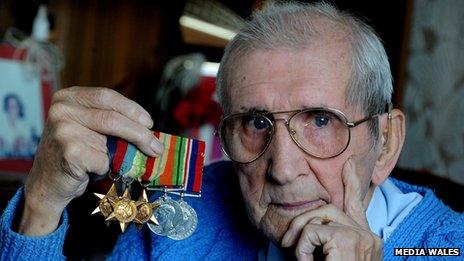Arctic convoys: Ivor Beaven's hope of Russian war medal
- Published

Ivor Beaven, 89, has medals - but not one he would like from Russia
Prime Minister David Cameron has given fresh hope to a Cardiff World War II veteran that he may be allowed to accept a Russian medal.
Ivor Beaven, 89, served as a stoker with the Royal Navy, escorting cargo ships in the Arctic convoys to supply the USSR as part of Operation Dervish.
Russia wants to honour the sailors' courage with the Ushakov Medal, but British rules are an obstacle.
But now Mr Cameron has told MPs he has "every sympathy" with their case.
Mr Cameron was asked at Prime Minister's Questions about a similar case and said a review would look at the general issue of medals, with the Arctic convoys "probably the most pressing".
Foreign and Commonwealth Office (FCO) rules say British veterans may not accept a foreign medal if the act being recognised took place more than five years ago, and if the serviceman has received, or is expected to receive, a UK award for the same services.
Today, 67 years after the end of the convoys, the UK government has so far not recognised the survivors with a dedicated campaign medal of their own, although the FCO points out that they are eligible for the broader WWII Atlantic Star.
Mr Beaven's case has been taken up by his Assembly Member Vaughan Gething, and on Wednesday the issue was raised in the Commons by MP Ian Swales, whose Redcar constituent John Ramsey is in the same position as Mr Beaven.
He told Mr Cameron: "The governments of Australia, Canada, New Zealand and the USA have agreed. The UK government have refused.
"Will you get this decision reversed quickly so my constituent John Ramsey and the rest of this dwindling band of veterans get the recognition they so richly deserve?"
Mr Cameron replied: "I have every sympathy with you and your constituent and that is why we have asked Sir John Holmes to conduct this review, not just into medals in general but to look specifically at some of the most important cases - of which I think Arctic convoys is probably the most pressing."
Speaking to Wales Online, external before Mr Cameron spoke, Mr Beaven, of Rumney, Cardiff, said: "I think it's a load of rubbish myself. Canada, New Zealand, Australia, America - all accepting it. Not this lot.
"That [David] Cameron's a young kid, he doesn't know what went on. I haven't got a clue why - I can only think they don't like Russia."
German U-boats
Mr Beaven was part of an operation to help keep Britain's Soviet allies in the war by delivering badly-needed food and equipment.
At the time Russia was surrounded by the Germans to their west and Japanese forces to their south and east.
Consequently the only route available was through the Arctic Circle north of occupied Norway and along a narrow channel which was heavily mined and patrolled by German U-boats.
More than 3,000 seamen died in Operation Dervish which saw supplies delivered to the Soviet ports of Murmansk and Archangel, enabling the Red Army to stave off the German invasion and eventually push west into Germany during 1944-45.
The Russian ambassador to the UK, Alexander Yakovenko, wrote to Mr Beaven, saying: "I wish to express to you once more on behalf of the people of Russia and the Russian government our profound gratitude for your heroism and courage."
He added: "Under the circumstances, the embassy only has to express its profound regret that while the authorities of Australia, Canada, New Zealand and the USA have granted permission to the veterans of the Arctic convoys to be awarded the Ushakov Medal, we are not in a position to honour in the same way the courage and sacrifice of the British heroes of the Arctic convoys."
Mr Gething, AM for Cardiff South and Penarth, said he had written to the FCO, and promised to keep up the pressure to have the decision reversed.
"It makes no sense that other countries across the world have granted permission for their veterans to receive the Ushakov Medal, and yet in Britain it is forbidden simply because of over-the-top bureaucratic procedure."
- Published15 May 2012
- Published12 November 2011
- Published31 August 2011